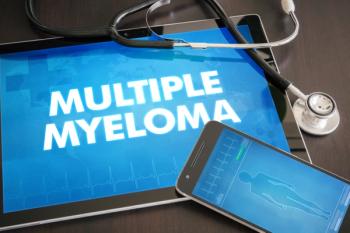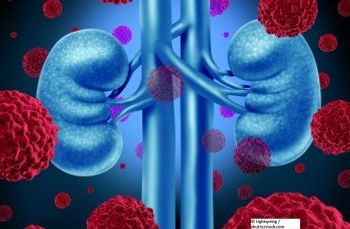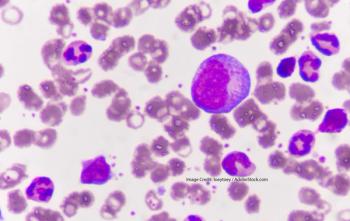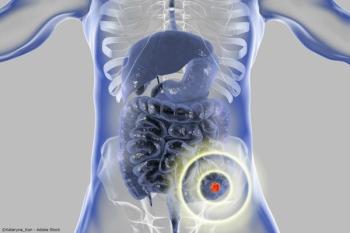
Pfizer Inc.’s phase 3 CROWN trial examining lorlatinib to treat patients with ALK-positive NSCLC met its primary end point of improving progression-free survival when compared to crizotinib.

Your AI-Trained Oncology Knowledge Connection!


Pfizer Inc.’s phase 3 CROWN trial examining lorlatinib to treat patients with ALK-positive NSCLC met its primary end point of improving progression-free survival when compared to crizotinib.

A study conducted by the Roswell Park Comprehensive Cancer Center found that patients undergoing radiation therapy for head and neck cancers were at a higher risk of less-favorable outcomes if they were unexpectedly hospitalized for dehydration, fever, or other ailments.

Biosight Ltd announced that the FDA granted fast track designation to aspacytarabine for the treatment of adult patients aged 75 years or older with acute myeloid leukemia.

CancerNetwork’s latest episode of the “Oncology Peer Review On-The-Go” podcast examines an article in the July issue of the journal ONCOLOGY on clinical trials during the COVID-19 pandemic.

Takeda Pharmaceutical Company Limited announced the FDA granted pevonedistat, its investigation NEDD8-activating enzyme inhibitor, breakthrough therapy designation to treat patients with higher-risk myelodysplastic syndrome.

A recent study found a 22% lower risk in developing colorectal cancer in the 3 years after patients took hypertension medications to treat high blood pressure, heart failure, or heart disease.

Black Diamond Therapeutics announced that the FDA granted fast track designation to BDTX-189 for the treatment of adult patients with solid tumors harboring an allosteric HER2 mutation or an EGFR or HER2 Exon 20 insertion mutation.

A Yale study found that states with expanded Medicaid diagnosed women with breast cancer at an earlier stage of disease and was associated with a reduced number of uninsured patients when compared to non-Medicaid expansion states.

In the newest episode of Oncology Peer Review On-The-Go, CancerNetwork speaks with Xu Ji, PhD, MSPH, of the Winship Cancer Institute about her research on the topic of adult cancer survivorship and mental health.

A study published in Cancer found that potentially avoidable hospitalizations for veterans with cancer who received chemotherapy through Medicare were more likely compared to those who received chemotherapy through the Veterans Health Administration.

Data from an abstract presented at the 2020 ASCO Virtual Scientific Program found that in-person visits at the University of Washington Urology Clinic were more time consuming and expensive for out-of-state patients and patients living in rural areas than telemedicine visits.

Researchers examined the effectiveness of telehealth in addressing rural-urban disparities in cancer care by establishing and analyzing synaptic knowledge networks presented at the 2020 ASCO Virtual Scientific Program.

Merck and Eisai announced that the FDA issued a complete response letter to its accelerated approval applications for the combination use of pembrolizumab plus lenvatinib to treat patients with unresectable hepatocellular carcinoma.

Cellectis recently announced the FDA placed its MELANI-01 trial treating multiple myeloma on clinical hold following the submission of a patient’s safety report.

The first episode of CancerNetwork's podcast Oncology Peer Review On-The-Go explores disparities in cancer care treatment among minorities and the significance of a representative sample in clinical trials.

A study presented at the AACR Virtual Annual Meeting II showed a significant decrease in mortality rate for patients with epithelial ovarian cancer when treated with lipophilic statins, supporting the further evaluation of statins to treat ovarian cancer in randomized clinical trials.

Jesus G. Berdeja, MD, of the Sarah Cannon Research Institute discussed the CARTITUDE-1 study that examined CAR-T cell therapy to treat patients with relapsed/refractory multiple myeloma presented at the 2020 ASCO Virtual Scientific Program.

A recent study, sparking further trials for investigation, saw improved clinical outcomes and reduced markers of inflammation for patients with severe COVID-19 after treatment with acalabrutinib, a selective BTK inhibitor.

A phase III study using cediranib and olaparib to treat recurrent platinum-sensitive ovarian cancer did not meet its primary endpoint of progression-free survival but did produce comparable activity to standard of care platinum-based chemotherapy treatment.

A study presented at the 2020 ASCO Scientific Program combining mirvetuximab soravtansine with bevacizumab to treat platinum-agnostic ovarian cancer demonstrated an encouraging overall response rate and tolerability profile regardless of platinum status.

A phase III study presented the 2020 ASCO Virtual Scientific Program showed encouraging efficacy data suggesting savolitinib could be used to treat patients with MET-driven papillary renal cell carcinoma.

Phase III data, presented at the 2020 ASCO Virtual Scientific Program, showed that treatment with osimertinib dramatically improved disease-free survival compared to placebo for patients with EGFR-mutated advanced NSCLC.

A study found that a 6-month follow-up examination was recommended for women found to have BI-RADS 3 lesions after previous recommendations suggested a year follow-up was safely sufficient.

Researchers from a study published in Cancers discovered a new method of detecting endometrial cancer in women via a simple, non-invasive blood test.

A recent study found 32 new sites on the human genome where variations in a woman’s DNA could alter her risk level, both increase and decrease, of getting breast cancer.

A recent study found that phase I queue designs were associated with a reduction in the expected study duration without changing risk limits or maximum tolerated dose determination when compared to the original parent design.

A recent examination of older adults with cancer found accelerated losses in differing sarcopenia measures existed before and after a cancer diagnosis.

A study found that dexrazoxane, a cardioprotective drug, preserved cardiac function without compromising overall survival and event-free survival for pediatric patients with acute myeloid leukemia.

A recent study implemented the Screen to Save program to educate racial/ethnic minority groups on colorectal cancer, finding that knowledge and screenings increased after patients completed the educational program.

Researchers found a steady increase in racial inequalities of the mortality rate from liver cancer from 1998-2016 after lifesaving drugs for hepatitis C virus were introduced.